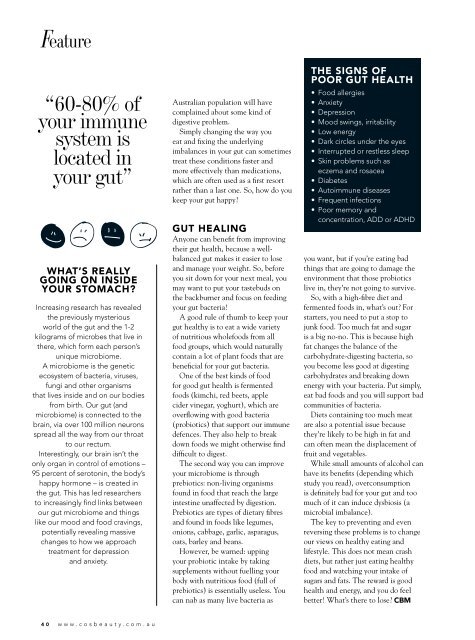CosBeauty Magazine #77
CosBeauty is the definitive Lifestyle, Health & Beauty guide with a global appeal. This issues includes features on: • The Breast Guide – Everything you need to know about breast Augmentation • Anti-ageing Skincare Heroes • Spring Makeup – 3 Totally Different Looks • Gut Health – Why it’s so important • 25 Products to Fake Flawless
CosBeauty is the definitive Lifestyle, Health & Beauty guide with a global appeal.
This issues includes features on:
• The Breast Guide – Everything you need to know about breast Augmentation
• Anti-ageing Skincare Heroes
• Spring Makeup – 3 Totally Different Looks
• Gut Health – Why it’s so important
• 25 Products to Fake Flawless
Create successful ePaper yourself
Turn your PDF publications into a flip-book with our unique Google optimized e-Paper software.
Feature<br />
“60-80% of<br />
your immune<br />
system is<br />
located in<br />
your gut”<br />
What’s really<br />
going on inside<br />
your stomach?<br />
Increasing research has revealed<br />
the previously mysterious<br />
world of the gut and the 1-2<br />
kilograms of microbes that live in<br />
there, which form each person’s<br />
unique microbiome.<br />
A microbiome is the genetic<br />
ecosystem of bacteria, viruses,<br />
fungi and other organisms<br />
that lives inside and on our bodies<br />
from birth. Our gut (and<br />
microbiome) is connected to the<br />
brain, via over 100 million neurons<br />
spread all the way from our throat<br />
to our rectum.<br />
Interestingly, our brain isn’t the<br />
only organ in control of emotions –<br />
95 percent of serotonin, the body’s<br />
happy hormone – is created in<br />
the gut. This has led researchers<br />
to increasingly find links between<br />
our gut microbiome and things<br />
like our mood and food cravings,<br />
potentially revealing massive<br />
changes to how we approach<br />
treatment for depression<br />
and anxiety.<br />
Australian population will have<br />
complained about some kind of<br />
digestive problem.<br />
Simply changing the way you<br />
eat and fixing the underlying<br />
imbalances in your gut can sometimes<br />
treat these conditions faster and<br />
more effectively than medications,<br />
which are often used as a first resort<br />
rather than a last one. So, how do you<br />
keep your gut happy?<br />
Gut healing<br />
Anyone can benefit from improving<br />
their gut health, because a wellbalanced<br />
gut makes it easier to lose<br />
and manage your weight. So, before<br />
you sit down for your next meal, you<br />
may want to put your tastebuds on<br />
the backburner and focus on feeding<br />
your gut bacteria!<br />
A good rule of thumb to keep your<br />
gut healthy is to eat a wide variety<br />
of nutritious wholefoods from all<br />
food groups, which would naturally<br />
contain a lot of plant foods that are<br />
beneficial for your gut bacteria.<br />
One of the best kinds of food<br />
for good gut health is fermented<br />
foods (kimchi, red beets, apple<br />
cider vinegar, yoghurt), which are<br />
overflowing with good bacteria<br />
(probiotics) that support our immune<br />
defences. They also help to break<br />
down foods we might otherwise find<br />
difficult to digest.<br />
The second way you can improve<br />
your microbiome is through<br />
prebiotics: non-living organisms<br />
found in food that reach the large<br />
intestine unaffected by digestion.<br />
Prebiotics are types of dietary fibres<br />
and found in foods like legumes,<br />
onions, cabbage, garlic, asparagus,<br />
oats, barley and beans.<br />
However, be warned: upping<br />
your probiotic intake by taking<br />
supplements without fuelling your<br />
body with nutritious food (full of<br />
prebiotics) is essentially useless. You<br />
can nab as many live bacteria as<br />
The signs of<br />
poor gut health<br />
• Food allergies<br />
• Anxiety<br />
• Depression<br />
• Mood swings, irritability<br />
• Low energy<br />
• Dark circles under the eyes<br />
• Interrupted or restless sleep<br />
• Skin problems such as<br />
eczema and rosacea<br />
• Diabetes<br />
• Autoimmune diseases<br />
• Frequent infections<br />
• Poor memory and<br />
concentration, ADD or ADHD<br />
you want, but if you’re eating bad<br />
things that are going to damage the<br />
environment that those probiotics<br />
live in, they’re not going to survive.<br />
So, with a high-fibre diet and<br />
fermented foods in, what’s out? For<br />
starters, you need to put a stop to<br />
junk food. Too much fat and sugar<br />
is a big no-no. This is because high<br />
fat changes the balance of the<br />
carbohydrate-digesting bacteria, so<br />
you become less good at digesting<br />
carbohydrates and breaking down<br />
energy with your bacteria. Put simply,<br />
eat bad foods and you will support bad<br />
communities of bacteria.<br />
Diets containing too much meat<br />
are also a potential issue because<br />
they’re likely to be high in fat and<br />
can often mean the displacement of<br />
fruit and vegetables.<br />
While small amounts of alcohol can<br />
have its benefits (depending which<br />
study you read), overconsumption<br />
is definitely bad for your gut and too<br />
much of it can induce dysbiosis (a<br />
microbial imbalance).<br />
The key to preventing and even<br />
reversing these problems is to change<br />
our views on healthy eating and<br />
lifestyle. This does not mean crash<br />
diets, but rather just eating healthy<br />
food and watching your intake of<br />
sugars and fats. The reward is good<br />
health and energy, and you do feel<br />
better! What’s there to lose? CBM<br />
40 www.cosbeauty.com.au


















